
Natural born mathematicians
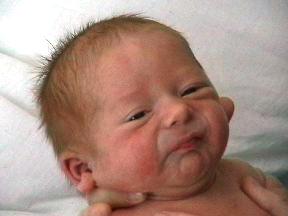
One day old, and already a mathematician
When was your very first mathematical thought? At age four? Three? Two? It may surprise you, but it was certainly earlier still - in fact, you were born a mathematician...
In the last few years, researchers have become accomplished at finding out what goes on in the minds of tiny children, even new-born babies. This is done either by watching their gaze (looking away indicates familiarity or boredom, staring intently indicates surprise or interest) or by giving them a dummy (the more they suck, the more interested they are). This means that we can tell what expectations babies have in different situations, and when those expectations are violated. What we have learnt is that, amazingly, we all come into this world ready-supplied with basic mathematical understanding.
"We are born with a core sense of cardinal number", says neuropsychologist Brian Butterworth, author of The mathematical brain, reviewed in this issue of Plus. "We understand that sets have a cardinality, that is, that collections have a number associated with them and it doesn't really matter what the members of that set are. Infants, even in the first week of life, notice when the number of things that they're looking at changes.
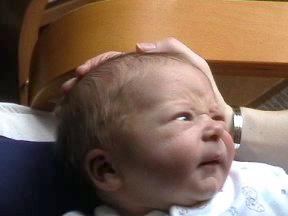
Was that a 2 or a 3?
Impressive as this ability is, newborn babies are even more mathematically accomplished. They have arithmetical expectations, says Butterworth. "If you show a baby that you're hiding one thing behind a screen, and then you show the baby that you're hiding another thing behind the screen, the baby will expect there to be two things behind the screen, and will be surprised if this expectation is violated." So even before babies can focus their eyes, they are surprised to see a sum with the wrong answer!
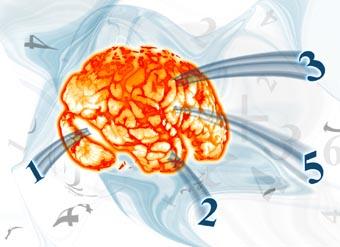
Numbers on the brain
These core abilities, which Butterworth calls the "number module", may be the foundation of everything we learn about mathematics later in our lives. He speculates on this in The mathematical brain - "but I have to stress that it is speculation, because what we need to know is whether babies use the same bit of brain as adults. Adults use the left parietal lobe for this ability to recognise small cardinalities. If babies use the same bit of brain, then the course of learning more advanced mathematics builds on this core. If it's a different bit of brain, it's back to the drawing board."
The notion that children have no mathematical abilities whatsoever until they are old enough to have elements of logical reasoning (four or five years old) is very influential, and was held by the famous educationalist Piaget. Clearly this view isn't correct, but according to Butterworth, some of the mathematical abilities Piaget studied may have deeper aspects that children don't achieve until they're four or five. However, he thinks that "these abilities, such as one-to-one correspondence, are built on a basis which is innately specified. Manipulating sets really does need the achievement of some kind of logical abilities that babies don't have. So maybe Piaget was right in a way, but if he was working today he would see that the child has more going for it when it gets to four or five than simply transitive reasoning, class inclusion, these very general logical ideas, it's also got an primitive idea of cardinality."
As a neuropsychologist, Butterworth has seen many patients with bizarre deficits caused by brain damage. In fact, some of the earliest clues to the existence of the number module came from such patients. "I came across patients who seemed to be perfectly alright in every other respect except their mathematical ability", he says. "Something happened to their brain, as the result of a stroke usually, and afterwards they seemed to be unable to do mathematics. This is a condition known as acalculia. A lot of people thought that mathematics was just language and we thought that if this was so then how could it be that Mrs G. speaks perfectly well, reasons okay, but can't count above 4? So we started to investigate in a bit more detail, and kept our eyes open for patients with other similar kinds of problems and that's really how we got started.
"Recently I've been seeing patients who have terribly disordered language but whose maths is still perfectly good, for example, one guy who has an incredibly striking dissociation. He is unable to understand the simplest words. If you ask him 'what is this?' he can't say 'watch', and if you ask him to point to a watch, he can't do that either. But he is still able to do long multiplication and long division, and to understand the principles behind these operations."
Adults thinking about mathematics tend to think about it as something logical, which of course it is, it has its own structure, but it doesn't develop according to that structure in our minds. You might think that you would have to have the concept of zero before developing thinking about sets and cardinalities, but what neuropsychology shows is that this isn't so. The number module isn't something we develop according to some logically consistent scheme, instead it's inbuilt - instinctive, in fact. "The child's acquisition of mathematical ideas actually seems to recapitulate the history of mathematics", says Butterworth. "But it doesn't recapitulate the logic of mathematics. For example, in the history of mathematics, the concept of zero is rather late. In the Frege-Russell construction of numbers it's rather early! So I would say that we can reinterpret the history of mathematics in the light of the child's development. We could say that some ideas are very easy, rather straightforward extensions of what the individual was born with, and some ideas are rather more complicated, because they're not so natural. Ideas like probability for example, are not very natural. We're very bad at probability, which of course is why insurance companies and banks are rich! You don't really get a mathematical theory of probability until the seventeenth century. That just reflects that ideas of probability are very difficult."
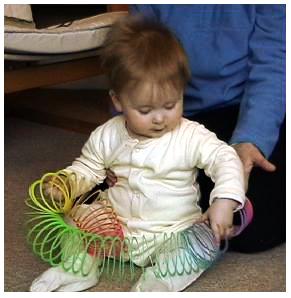
Using my hands teaches me maths
Interestingly, and suggestively, there is evidence that early mathematical development is related to certain physical skills. We all start to count on our fingers, and only later do most (but by no means all!) of us abandon our fingers in favour of mental calculation. Butterworth and his colleagues have just started a project looking at people with dyspraxia. "This means they have difficulty in controlling their bodily movements", he explains. "There are degrees of it, mostly dyspraxics are just a bit clumsy. They tend to have particularly poor finger dexterity, and we want to know, what's their maths like? We have anecdotal evidence that these people are worse at maths than the average, both as children and as adults. But we don't know why that is. It might have to do with their manual dexterity or lack of it, or it might have to do with something else. There might be a common cause for a whole range of different difficulties. We want to know if the kinds of difficulties they have are the sorts you would expect them to have if they had problems counting on their fingers when they were little."
One particularly interesting case, Butterworth says, concerns a woman with a very rare genetic disorder, who was born with neither hands nor feet. She reportedly says that, when doing mental arithmetic, she puts her "imaginary hands" on an imaginary table in front of her and uses them to do the calculation. So it seems that the connection between our hands and our number ability is deeper than we might think at first glance. It's interesting to speculate that hands might be a crucial part of what raises human mathematical ability so far above that of other animals, many of whom are also able to distinguish small cardinalities, but who never develop anything further based on that ability.

Putting in the hours
So far we've only talked about the most basic mathematics - arithmetic and an inbuilt notion of cardinal number. What about more advanced, or adult, mathematical ability? The evidence seems to explain how things can go very wrong - via brain damage or physical problems with dexterity - but what about when things go very right? How come some people are so good at mathematics, and so creative?
In Western culture, the most prevalent theory about talent is that it is innate. When someone is outstandingly good at something, we describe them as "gifted", and say they are "naturals". This idea is not so common in other societies, where hard work is seen as the primary reason why some people excel.
According to Butterworth, all the evidence supports the hard work theory. He goes so far as to say that the only "statistically significant" indicator of mathematical excellence is the number of hours put in. This seems to suggest that anyone could be a superb mathematician if they are willing to put in the hours - but the truth is slightly more nuanced. The crucial word here is "willing". Butterworth says that "anybody who is a good mathematician is slightly obsessed with maths - or more slightly obsessed - and they put a lot of hours into thinking about it. So they are unusual in that respect. But they may be no more unusual than anybody who is very good at what they do, because they have to have a certain obsessiveness or otherwise they're not going to be able to put in the hours to get to this level of expertise. This is true of musicians, it's probably true of waiters. Now, if you start putting in the hours when you are very young, how are we going to tell whether your adult state has got to do with what your brain was like before you started to put in the hours, or what it was like because you put in the hours?"
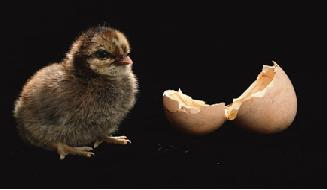
Which came first?
Butterworth is slightly impatient with this chicken and egg question - which comes first, zeal or hard work? He says that "if, for whatever reason, you start working hard at mathematics when all your classmates don't, then the teacher is going to favour you, so you're going to get external rewards, and you're going to get the internal rewards of being able to do something rather well that your mates aren't so good at, and so you'll start off a virtuous circle of external rewards, internal rewards, you work a bit harder, you get even farther ahead of your classmates, who aren't actually putting in the time. So it wouldn't be surprising that if random people who for some reason select to pursue maths on the whole get rewarded because they are going to be better than their peers."
There are particular cases which give great weight to what we might call the "zeal theory of excellence". Butterworth describes the recent case of Rüdiger Gamm, a German who started to teach himself to become a prodigious calculator in his twenties, because he wanted to win a prize on a TV game show. He won the prize, and became very famous in Germany as a calculator. "He can do wonderful things, because he spent four hours a day since he was twenty working on it, learning new tricks, learning the table of cubes and cube roots, and to the power of four and fourth roots and so on. He learned all the tricks he could find, and worked out tricks for himself."
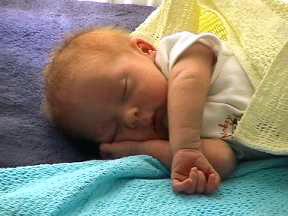
All that maths has tired me out
About this article
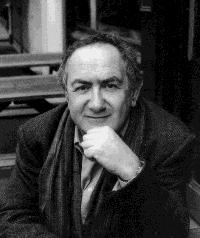
Helen Joyce is editor of Plus.
For this article Helen interviewed Brian Butterworth, Professor of Cognitive Neuropsychology at University College, London and founding editor of the academic journal "Mathematical Cognition". He has taught at Cambridge and held visiting appointments at the universities of Melbourne, Padua and Trieste, MIT and the Max Planck Institute at Nijmegen. He is currently working with colleagues on the neuropsychology and the genetics of mathematical abilities.
You can find out more at his website www.mathematicalbrain.com.